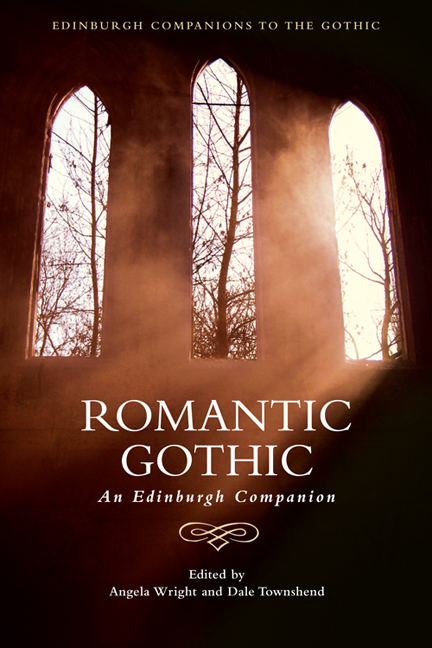Book contents
- Frontmatter
- Contents
- 1 Gothic and Romantic: An Historical Overview
- Part I Gothic Modes and Forms
- Part II National and International Borders
- Part III Reading the Romantic Gothic
- 15 Gothic and the Language of Terror
- 16 Gothic Science
- 17 Gender and Sexuality in Gothic Romanticism
- 18 Gothic Forms of Time: Architecture, Romanticism, Medievalism
- 19 Gothic Theology
- Notes on Contributors
- Index
15 - Gothic and the Language of Terror
from Part III - Reading the Romantic Gothic
Published online by Cambridge University Press: 05 August 2016
- Frontmatter
- Contents
- 1 Gothic and Romantic: An Historical Overview
- Part I Gothic Modes and Forms
- Part II National and International Borders
- Part III Reading the Romantic Gothic
- 15 Gothic and the Language of Terror
- 16 Gothic Science
- 17 Gender and Sexuality in Gothic Romanticism
- 18 Gothic Forms of Time: Architecture, Romanticism, Medievalism
- 19 Gothic Theology
- Notes on Contributors
- Index
Summary
In her essay ‘On the Supernatural in Poetry’ (1826), Ann Radcliffe draws on Edmund Burke's A Philosophical Enquiry into the Origin of our Ideas of the Sublime and Beautiful (1757) in order to posit a distinction between ‘terror’ and ‘horror’. As Radcliffe's famous differentiation between the two terms goes:
Terror and horror are so far opposite, that the first expands the soul, and awakens the faculties to a high degree of life; the other contracts, freezes, and nearly annihilates them. I apprehend, that neither Shakespeare nor Milton by their fictions, nor Mr Burke by his reasoning, anywhere looked to positive horror as a source of the sublime, though they all agree that terror is a very high one. (Radcliffe 2004: 47)
Burke had argued that ‘To make anything very terrible, obscurity seems in general to be necessary’ (Burke 1990: 54), and, following this, Radcliffe asks ‘where lies the great difference between horror and terror, but in the uncertainty and obscurity, that accompany the first, respecting the dreaded evil?’ (Radcliffe 2004: 47). She presents the ghost scene in Shakespeare's Macbeth as an example of the transient ‘thrill’ that horror provides, while she praises the ghost scene of Hamlet as an example of the sublime ‘tranquility tinged with terror’ commended by Burke (Radcliffe 2004: 47), describing how in Hamlet ‘[e]very minute circumstance’ leading up to the appearance of the ghost on stage contributes to the success of the scene:
The dark watch upon the remote platform, the dreary aspect of the night, the very expression of the officer on guard, ‘the air bites shrewdly; it is very cold;’ the recollection of a star, an unknown world, are all circumstances which excite forlorn, melancholy, and solemn feelings, and dispose us to welcome, with trembling curiosity, the awful being that draws near; and to indulge in that strange mixture of horror, pity, and indignation, produced by the tale it reveals. (Radcliffe 2004: 45)
Although Radcliffe does not explicitly address the role of language here, I would argue that it is central to her account of the scene in two ways. First, language itself acts as an instrument of Gothic terror.
- Type
- Chapter
- Information
- Romantic GothicAn Edinburgh Companion, pp. 289 - 305Publisher: Edinburgh University PressPrint publication year: 2015



